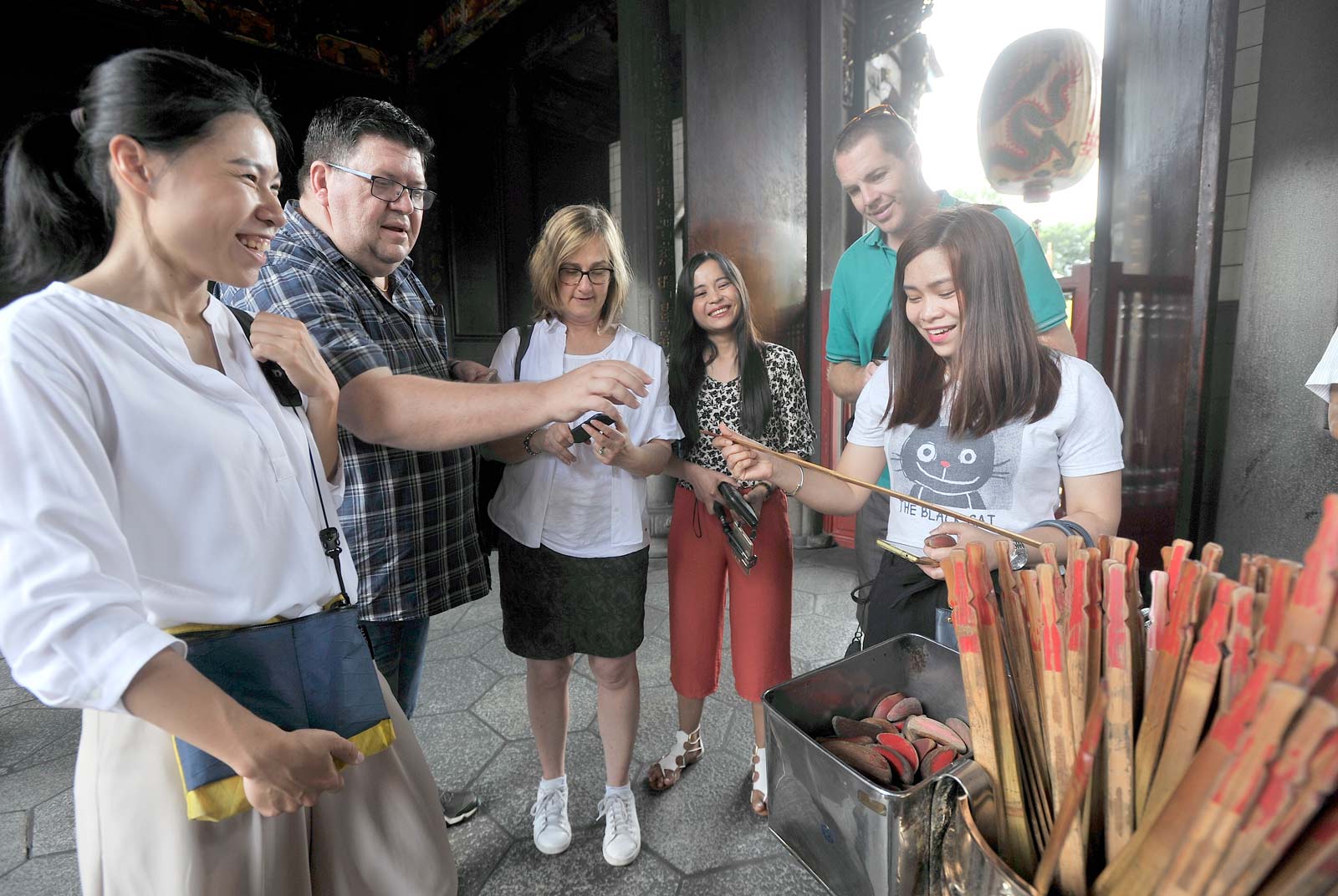Progress begins from within. An international Taiwan is in reach.

Source:Kuo-Tai Liu
In this op-ed, John Murn discusses Taiwan's internationalization issue. Drawing on personal experiences, he emphasizes the need for Taiwan to become more inclusive and global. How can Taiwan embrace its international potential and forge a legacy of progress?
Views
Progress begins from within. An international Taiwan is in reach.
By John Murnweb only
“Where are you from?”
“Why did you come to Taiwan?”
I was asked these questions twice yesterday in Taipei, once on the street as I was waiting for a friend, once by the person sitting next to me at a noodle shop. The questions are innocent enough, but their omnipresence is revealing about the state of internationalization in Taiwan. In short, Taiwan has barely gotten started.
Each presidency offers the possibility of introducing groundbreaking economical and cultural policies that can leave a legacy of modernization and transformation. The forthcoming term offers a huge opportunity to support local business and create new jobs by starting important work towards internationalizing Taiwan. Will this presidency be the one that puts Taiwan on the path to internationalization?
While Taiwan has been inviting people to live and work here on an increasingly diverse set of visas and is beginning to accept them as residents and immigrants, it is still a far cry from the standards set by leading destinations for Taiwanese talent in East Asia and Southeast Asia. In response to this situation, I urge you to resist the temptation to create the next shiny immigration concept, and instead dedicate resources to the much needed task of modernizing existing laws, policies, and cultural norms.
In the past 15 years, I have collaborated with government-led initiatives to encourage OEM businesses to start their own brands, special visas and grants for entrepreneurs, and a job board to support foreign talent matching in Taiwan. The time is ripe for the government to step up with programs to promote internationalization and support local businesses.
The long-term effects of not taking this approach will deprive local and foreign-owned businesses of sorely needed talent and sustain outdated ideas about the differences between Taiwanese and the immigrants who want to feel at home on this island.
Above all, internationalization is about people, so we must start with policies that place local and international residents on the same level. Policy and public opinion take considerable time and effort to change, so I have focused my suggestions on actions that could be put in motion within the next four years.
Shape the next generation of Taiwanese
International families want to feel accepted, not made to feel as if they are novel.
The idea of being Taiwanese will continue to evolve as the current generation has more mixed-race citizens than any before it. Accordingly, the Taiwanese government has the opportunity to foster discussions about different kinds of people living here through outreach programs in schools and marketing campaigns.
Sadly, I hear from friends in mixed marriages that their Taiwanese children – who go to public schools and speak Mandarin - are regularly called 外國人 (waiguoren, which means “foreigner”) and treated differently than their classmates. One friend recently shared that while on a hike, he had to ask several people to stop taking photos and videos of him and his kids.
It’s hard to change the mind of an adult, but kids can be raised to accept an evolving Taiwanese identity before they form other ideas. If Taiwan wants internationals to stay for the long-term, they need to know their families will feel safe and welcome – especially when they hold Taiwanese passports and national ID cards.
Inclusive family visa policies
Broader, more gracious visa policies allowing visa holders to bring parents or other relatives would encourage people to settle in Taiwan. There has been some recent progress regarding non-Taiwanese who are born in Taiwan, however, creating long-term open work permits for non-Taiwanese spouses and visas that can accommodate freelance and remote work would create flexibility for families as they acclimate to Taiwan.
Education for SMEs, particularly HR
Small and medium-sized enterprises make up most of the Taiwanese economy, yet are under-educated on the process of hiring and retaining international professionals.
When All Hands Taiwan hosted its job fairs in 2019 and 2020, local companies noted several considerations that got in the way of hiring the talent they needed – whether they sought to hire for international sales, specialized engineering positions, and other roles. These companies cited language barriers in HR, unfamiliarity with visa processes and regulations, limited job boards and talent pools, workplace culture concerns, and salary and benefit limitations as some reasons they hadn’t employed non-Taiwanese talents.
Now is the time to extend government-backed visa services for HR departments to ease and facilitate the process of hiring and retaining international professionals. Going further, the government could offer workshops to certify HR professionals for international hiring.
Stop treating migrant workers differently
Taiwan’s largest group of foreign residents are the 700,000 migrant workers from Southeast Asia. This group can legally be paid less money, their employers may limit their residential and travel mobility, and traditionally they have been subject to brutal agent systems that cut into their already low wages – and may withhold their passports.
Fostering different standards galvanizes the idea that it is acceptable for laws to designate second-class citizens. These groups are caregivers to the elderly at a time when the population is aging rapidly, and they play crucial roles in food stability and production, manufacturing, and construction. Discriminatory practices contribute to classist and racist ideas that a significant proportion of Taiwanese have about Southeast Asians.
Making good on this human rights issue is a strong signal of a developed nation. Reforms for this group of foreign residents must happen alongside other initiatives to internationalize Taiwan, lest its efforts be seen as hypocritical.
Eliminate 18% withholding tax
The 18% holding tax option for companies whose employees reside in Taiwan for less than 183 days is out-of-date and manipulative. What’s more, the practice is inconsistently applied by some companies and not others.
While it’s true that the gap between the 18% and any lower rate can be returned each year, it is unnecessary to withhold the extra money and it is not a practice that Taiwanese are subject to. Originally devised to protect companies from employees who might leave without completing their tax processes, the onus should be on the company to simply withhold standard tax rates, which would put the employee in compliance with the amount they were expected to contribute.
This regulation does little more than show a suspicious attitude towards international residents and infringe on residents’ financial freedoms to spend, save, and invest as they wish.
Take advantage of international perspectives in Taiwan
Taiwan has numerous talent-filled and well-informed organizations, eager to support decision making and contribute to making Taiwan a better place for everyone. But other than responding to the American Chamber of Commerce’s annual whitepaper, there are few, if any, other channels open for international communities to connect with the Taiwanese government in meaningful ways that contribute to change.
Without the ability to vote or the lobbying power of an international corporation, we have no effective way of contributing to policy-making, even policies meant to address immigrant or foreign resident issues. At the same time, we have watched as many programs and initiatives aimed at international residents have missed the mark because they clearly were not guided by input from those communities but instead based on what Taiwanese assumed was wanted or needed. This presents another opportunity to create jobs: employ international professionals on government projects, platforms, and initiatives that directly impact foreign residents and communities.
Groups with different perspectives and skills offer Taiwan a feedback loop for more effective policies that address needs and test ideas. I urge politicians to look past the photo opportunity, and identify paths and roles that make change possible.
We can do this!
Reducing the novelty of non-Taiwanese people is a crucial baseline for creating a society in which all residents are comfortable and contribute to one another’s cultural experiences. Broadly speaking, the easiest way to achieve this is to increase the number of international residents and visitors. Returning tourism and visa numbers to pre-COVID levels will help recover Taiwan’s momentum in this respect. But to attract and retain talent, mere exposure won’t make a big enough impact.
It's understandable that most of the issues mentioned here haven’t been acted upon. While it’s possible that talent shortages and other issues could become increasingly pressing, these topics have not yet created a discernible pain point for a significant number of Taiwanese. However, they are economically and culturally important for the shaping of Taiwan’s place in the world.
Implementing globally-accepted approaches to work and management, normalizing immigrants’ place in society, allowing a significant number of people to naturalize as citizens, and adding global elements to the culture are difficult tasks, but there’s no better time than now to start. These updates can significantly increase the likelihood that foreign residents will stay longer in Taiwan - integrating with the workforce, economy, culture, and society – leading to a more global world view for Taiwanese people and businesses. Who wouldn’t want that legacy?
(This piece reflects the author's opinion, and does not represent the opinion of CommonWealth Magazine.)
The CommonWealth English website and CommonWealth Magazine's Independent Opinion (獨立評論) continue to accept op-eds for the new president. Please follow this link for more info.
About the author:

John Murn is an international higher education consultant, local business owner, and co-founder of All Hands Taiwan — a non-profit association internationalizing Taiwan with English-language professional networking and hiring events, research, and advocacy. In these roles, he advises governmental organizations and trade offices on topics spanning staffing, talent retention, recruitment, and development at local and national levels.
Have you read?
- Aotearoa
- Rethinking immigration to halt a growing economic security crisis
- Why is there so little policy debate in Taiwan’s presidential campaigns?
Uploaded by Ian Huang






